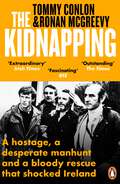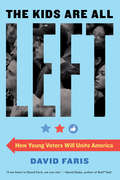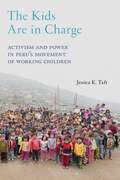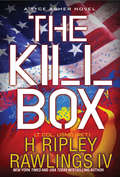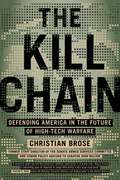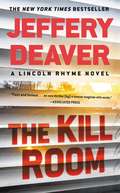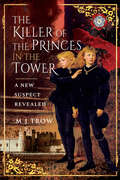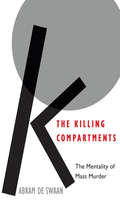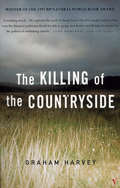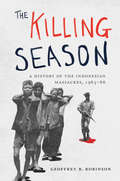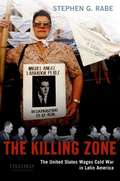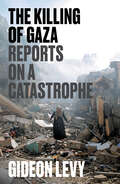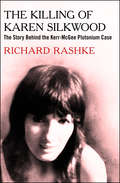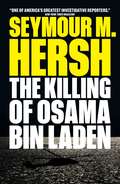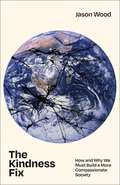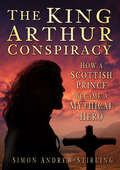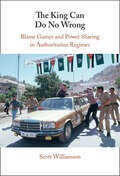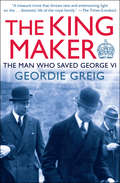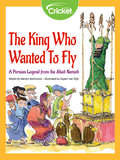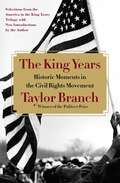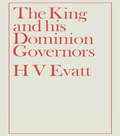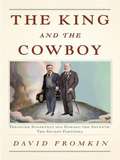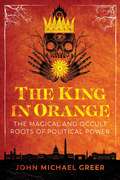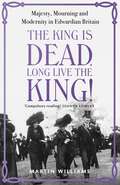- Table View
- List View
The Kidnapping: A hostage, a desperate manhunt and a bloody rescue that shocked Ireland
by Ronan McGreevy Tommy Conlon‘Riveting . . . a triumph . . . intertwining personal narratives with wider themes of remembrance, loss, courage and blame’ Gary Murphy, Irish ExaminerNovember 1983. Early morning in suburban south Dublin. Businessman Don Tidey is snatched from his car and the IRA has its latest kidnap victim. Weeks later he is tracked down to an isolated Leitrim wood, but in saving Tidey’s life a recruit garda and a soldier lose theirs.The Kidnapping is a brilliantly reported account of this landmark event by two accomplished journalists and Leitrim natives. Delving deep, they provide a chilling account of the lead-up to Tidey’s abduction, the massive manhunt that followed, his bloody rescue, the botched attempts to capture his abductors and the devastating fall-out – personal and national – that followed.At the heart of The Kidnapping revealing interviews with Don Tidey – speaking about his experience in detail for the first time – and with the families of Garda Gary Sheehan and Private Patrick Kelly, provide a startling and moving testimony of the lasting impact of these traumatic events. It is both a gripping read and one that raises profound questions for today’s Ireland.‘Vividly written, deeply insightful, extremely timely’ Business Post ‘A fascinating read . . . beyond that, it’s an important document’ Mick Clifford, The Mick Clifford Podcast‘A harrowing story . . . [but] an enjoyable book’ Irish Mail on Sunday‘An important reminder of our imperfect, contentious past’ Tommy Gorman, Irish Times‘Vivid . . . [shows] a deep understanding . . . insightful and emotional’ Sunday Independent‘A major page-turner . . . fascinating’ Nicola Tallant, Crime World podcast
The Kids Are All Left: How Young Voters Will Unite America
by David FarisA brewing generational shift to the Left is about to change politics—and our country—forever. A demographic apocalypse is coming for the Republican Party. Young voters overwhelmingly favor the Left, and the margins are at such an unprecedented and overwhelming scale that these voters are poised to end the partisan gridlock that has characterized politics for over thirty years. In The Kids Are All Left, political scientist David Faris proves beyond any doubt that this isn't just a typical generational trend that will even out over time and explores the policy transformations that young Americans will pursue. He offers hope for an escape from the political stalemate that has twice this century sent the loser of the popular vote to the White House, but he is realistic about the institutional obstacles that stand between voters and true majority rule. The result is a first look at America in the 21st century.
The Kids Are in Charge: Activism and Power in Peru's Movement of Working Children (Critical Perspectives on Youth #2)
by Jessica K. TaftDetails the possibilities and challenges of intergenerational activism and social movements Since 1976, the Peruvian movement of working children has fought to redefine age-based roles in society, including defending children’s right to work. In The Kids Are in Charge, Jessica K. Taft gives us an inside look at this groundbreaking, intergenerational social movement, showing that kids can—and should be—respected as equal partners in economic, social, and political life. Through participant observation, Taft explores how the movement has redefined relationships between kids and adults; how they put these ideas into practice within their organizations; and how they advocate for them in larger society. Ultimately, she encourages us to question the widely accepted beliefs that children should not work or participate in politics. The Kids Are in Charge is a provocative invitation to re-imagine childhood, power, and politics.
The Kill Box (A Tyce Asher Novel #2)
by H. Ripley Rawlings IVThe United States has been invaded. The Russians have seized control. Now US Marine hero Tyce Asher has one final mission—to make America free again—in this explosive series from Lt. Col. Hunter &“Rip&” Ripley Rawlings IV . . . THE CITIES HAVE FALLEN. America is under new management. Russian forces have occupied both coasts. They are taking our weapons, pillaging our resources, and destroying our nation. Those who resist are swiftly punished. Those who revolt are savagely killed . . . THE HEARTLAND FIGHTS BACK. Marine Corp officer Tyce Asher is a lone wolf patriot who will never surrender. He&’s assembled a ragtag team of long-haul truckers and citizen soldiers willing to die for their freedoms. Their network has learned that the invaders are planning to seize cargo that will bring America to its knees—and a sadistic Russian has marked Asher for death. There is only one way to stop them: Asher and his team must meet the enemy face-to-face—and enter the Kill Box . . . RAVES FOR ASSAULT BY FIRE &“Exploding with action, Lt. Col. Rip Rawlings&’s rapid-fire thriller, Assault by Fire, is a must read!&” —Mark Greaney, #1 New York Times bestselling author of One Minute Out &“Direct from his own combat experiences, Marine Lt. Col. Rip Rawlings brings the heat and fire to life." —Marc Cameron, New York Times bestselling author &“Combat vet Rip Rawlings is a bang-up storyteller.&” —Capt. Dale Dye USMC (Ret.), author and filmmaker &“Rip Rawlings writes from experience, and blasts the reader straight into the fight and never lets up.&” —New York Times bestselling author Larry Bond
The Kill Chain: Defending America in the Future of High-Tech Warfare
by Christian BroseFor generations of Americans, our country has been the world's dominant military power. How the US military fights, and the systems and weapons that it fights with, have been uncontested. That old reality, however, is rapidly deteriorating. America's traditional sources of power are eroding amid the emergence of new technologies and the growing military threat posed by rivals such as China. America is at grave risk of losing a future war.As Christian Brose reveals in this urgent wake-up call, the future will be defined by artificial intelligence, autonomous systems, and other emerging technologies that are revolutionizing global industries and are now poised to overturn the model of American defense. This fascinating, if disturbing, book confronts the existential risks on the horizon, charting a way for America's military to adapt and succeed with new thinking as well as new technology. America must build a battle network of systems that enables people to rapidly understand threats, make decisions, and take military actions, the process known as "the kill chain." Examining threats from China, Russia, and elsewhere, The Kill Chain offers hope and, ultimately, insights on how America can apply advanced technologies to prevent war, deter aggression, and maintain peace.
The Kill Room (A Lincoln Rhyme Novel #11)
by Jeffery DeaverIt was a "million-dollar bullet," a sniper shot delivered from over a mile away. Its victim was no ordinary mark: he was a United States citizen, targeted by the United States government, and assassinated in the Bahamas. The nation's most renowned investigator and forensics expert, Lincoln Rhyme, is drafted to investigate. While his partner, Amelia Sachs, traces the victim's steps in Manhattan, Rhyme leaves the city to pursue the sniper himself. As details of the case start to emerge, the pair discovers that not all is what it seems. When a deadly, knife-wielding assassin begins systematically eliminating all evidence--including the witnesses--Lincoln's investigation turns into a chilling battle of wits against a cold-blooded killer.
The Killer of the Princes in the Tower: A New Suspect Revealed
by M. J. TrowThe disappearance of two boys during the summer of 1483 has never been satisfactorily explained. They were Edward, Prince of Wales, nearly thirteen at the time, and his brother, Richard of York, nearly ten. With their father, Edward IV, dying suddenly at forty, both boys had been catapulted into the spotlight of fifteenth-century politics, which was at once bloody and unpredictable. Thanks to the work of the hack ‘historians’ who wrote for Henry VII, the first Tudor, generations grew up believing that the boys were murdered and that the guilty party was their wicked uncle, Richard, Duke of Gloucester. Richard crowned himself King of England in July 1483, at which time the boys were effectively prisoners in the Tower of London. After that, there was no further sign of them. Over the past 500 years, three men in particular have been accused of the boys’ murders – Richard of Gloucester; Henry Tudor, Earl of Richmond; and Henry Stafford, Duke of Buckingham. The evidence against them would not stand up in a court of law today, but the court of history is much less demanding and most fingers remain pointed squarely at Richard of Gloucester. This book takes a different approach, the first to follow this particular line of enquiry. It is written as a police procedural, weighing up the historical evidence without being shackled to a particular ‘camp’. The supposition has always been made that the boys were murdered for political reasons. But what if that is incorrect? What if they died for other reasons entirely? What if their killer had nothing to gain politically from their deaths at all? And, even more fascinatingly, what if the princes in the Tower were not the only victims?
The Killing Compartments
by Abram De SwaanThe twentieth century was among the bloodiest in the history of humanity. Untold millions were slaughtered. How people are enrolled in the service of evil is a question that continues to bedevil. In this trenchant book, Abram de Swaan offers a taxonomy of mass violence that focuses on the rank-and-file perpetrators, examining how murderous regimes recruit them and create what De Swaan calls the "killing compartments” that make possible the worst abominations without apparent moral misgiving, without a sense of personal responsibility, and, above all, without pity. De Swaan wonders where extreme violence comes from and where it goes#151;seemingly without a trace#151;when the wild and barbaric gore is over. And what about the perpetrators themselves? Are they merely and only the product of external circumstance? Or is there something in their makeup that disposes them to become mass murderers? Drawing on a wide range of disciplines, including sociology, anthropology, political science, history, and psychology, De Swaan sheds new light on an urgent and intractable pathology that continues to poison peoples all over the world.
The Killing Of The Countryside
by Graham HarveyOver then past fifty years the British countryside has changed out of all recognition. A wide range of wildlife species are disappearing - victims of modern intensive farming, of pesticides and fertilisers and the sheer relentless pressure to maximise output from every hedge bank and field corner. It need not have happened. The loss of our wildlife and countryside has come about through a deliberate and sustained national policy, one that costs the British people 8 billion a year. The Killing of the Countryside is a devastating attack on modern British agricultural policy and practice and a plea for a return to natural cycles, an end to subsidies and the domination of agribusiness, and for a safe, sustainable farming system.Winner of the 1997 BP Natural World Book Award.
The Killing Season: A History of the Indonesian Massacres, 1965-66
by Geoffrey B. RobinsonThe Killing Season explores one of the largest and swiftest, yet least examined, instances of mass killing and incarceration in the twentieth century—the shocking antileftist purge that gripped Indonesia in 1965–66, leaving some five hundred thousand people dead and more than a million others in detention.An expert in modern Indonesian history, genocide, and human rights, Geoffrey Robinson sets out to account for this violence and to end the troubling silence surrounding it. In doing so, he sheds new light on broad and enduring historical questions. How do we account for instances of systematic mass killing and detention? Why are some of these crimes remembered and punished, while others are forgotten? What are the social and political ramifications of such acts and such silence?Challenging conventional narratives of the mass violence of 1965–66 as arising spontaneously from religious and social conflicts, Robinson argues convincingly that it was instead the product of a deliberate campaign, led by the Indonesian Army. He also details the critical role played by the United States, Britain, and other major powers in facilitating mass murder and incarceration. Robinson concludes by probing the disturbing long-term consequences of the violence for millions of survivors and Indonesian society as a whole.Based on a rich body of primary and secondary sources, The Killing Season is the definitive account of a pivotal period in Indonesian history. It also makes a powerful contribution to wider debates about the dynamics and legacies of mass killing, incarceration, and genocide.
The Killing Zone: The United States Wages Cold War in Latin America
by Stephen G. RabeThe Killing Zone: The United States Wages Cold War in Latin America is a comprehensive yet concise analysis of U.S. policies in Latin America during the Cold War. Author Stephen G. Rabe, a leading authority in the field, argues that the sense of joy and accomplishment that accompanied the end of the Cold War, the liberation of Eastern Europe, and the collapse of the Soviet Union must be tempered by the realization that Latin Americans paid a ghastly price during the Cold War. Dictatorship, authoritarianism, the methodical abuse of human rights, and campaigns of state terrorism characterized life in Latin America between 1945 and 1989. Countries such as Argentina, Brazil, Chile, El Salvador, and Guatemala endured appalling levels of political violence. The U.S. repeatedly intervened in the internal affairs of Latin American nations in the name of anticommunism, destabilizing constitutional governments and aiding and abetting those who murdered and tortured.
The Killing of Gaza: Reports on a Catastrophe
by Gideon LevyReportage from the frontline of the crisis in the Middle East from a leading Israeli journalistGideon Levy is one of the most respected critics of Israel's apartheid policies against the Palestinian people. He is the outspoken award-winning journalist who has been writing on the conflict for decades.In The Killing of Gaza he brings together his on-the-ground perspectives of the events leading up to the October 7th attack and the ensuing devastation of Gaza.His clear-eyed analysis is a vital aperture into current events but he also brings essential historical and political context to the moment. He is unafraid to speak truth to power, and his work is an urgent rebuttal to the propaganda that is distributed through the mainstream press throughout the world.Levy's words should be read by anyone who wants to get the heart of this most brutal conflict and see for themselves that silence is no longer possible in the face of such atrocity.
The Killing of Karen Silkwood: The Story Behind the Kerr-McGee Plutonium Case
by Richard RashkeOn November 13, 1974, Karen Silkwood was driving on a deserted Oklahoma highway when her car crashed into a cement wall and she was killed. On the seat next to her were doctored quality-control negatives showing that her employer, Kerr-McGee, was manufacturing defective fuel rods filled with plutonium. She had recently discovered that more than forty pounds of plutonium were missing from the Kerr-McGee plant. Forty years later, her death is still steeped in mystery. Did she fall asleep before the accident, or did someone force her off the road? And what happened to the missing plutonium? The Killing of Karen Silkwood meticulously lays out the facts and encourages the readers to decide. Updated with the author's chilling new introduction that discusses the similarities with Edward Snowden's recent revelations, Silkwood's story is as relevant today as it was forty years ago. For this updated edition, the author has added the latest information as to what happened to the various people involved in the Silkwood case and news of the lasting effects of this underreported piece of the history of the antinuclear movement.
The Killing of Osama Bin Laden
by Seymour M. HershElectrifying investigation of White House lies about the assassination of Osama bin LadenIn 2011, an elite group of US Navy SEALS stormed an enclosure in the Pakistani city of Abbottabad and killed Osama bin Laden, the man the United States had begun chasing before the devastating attacks of 9/11. The news did much to boost President Obama's first term and played a major part in his reelection victory of the following year. But much of the story of that night, as presented to the world, was incomplete, or a lie. The evidence of what actually went on remains hidden.At the same time, the full story of the United States' involvement in the Syrian civil war has been kept behind a diplomatic curtain, concealed by doublespeak. It is a policy of obfuscation that has compelled the White House to turn a blind eye to Turkey's involvement in supporting ISIS and its predecessors in Syria.This investigation, which began as a series of essays in the London Review of Books, has ignited a firestorm of controversy in the world media. In his introduction, Hersh asks what will be the legacy of Obama's time in office. Was it an era of "change we can believe in" or a season of lies and compromises that continued George W. Bush's misconceived War on Terror? How did he lose the confidence of the general in charge of America's forces who acted in direct contradiction to the White House? What else do we not know?
The Kindness Fix: How and Why We Must Build a More Compassionate Society
by Jason WoodIf a measure of our humanity is how we treat the most vulnerable, our report card is bleak. Our politics is divided, people in need are too often treated with cruelty, and the systems we built to support others are creaking. Welfare too often fails, sometimes with tragic consequences. Yet, the help we give to others can be more effective, more accepted, and more just if we cultivate greater levels of compassion to put it at the heart of public life and potentially resolve these challenges. In this book, Jason Wood reviews the research and talks to experts from across the world to make the moving case for greater compassion in public life.
The King Arthur Conspiracy: How a Scottish Prince Became a Mythical Hero
by Simon StirlingArthur led the Britons to the brink of victory but was cut down by treachery and betrayal. Arthurian legends have since been corrupted, leading to popular but false assumptions about the king and the belief that his grave could never be found. Drawing on a vast range of sources and new translations of early British and Gaelic poetry, Arthur explodes these myths and exposes the shocking truth. In this, the first full biography of Arthur, Simon Andrew Stirling provides a range of proofs that Artuir mac Aedain was the original King Arthur; he identifies the original Camelot, the site of Arthur’s last battle and his precise burial location. For the first time ever, the role played by the early Church in Arthur’s downfall and the fall of North Britain is also revealed. This includes the Church’s contribution to fabricated Arthurian history, the unusual circumstances of his burial and the extraordinary history of the sacred isle on which he was buried.
The King Can Do No Wrong: Blame Games and Power Sharing in Authoritarian Regimes
by Scott WilliamsonWhy are some autocrats more effective than others at retaining popular support even when their governments perform poorly? To develop insights into popular politics and governance across authoritarian regimes, this book stresses the importance of understanding autocratic blame games. Scott Williamson argues that how autocrats share power affects their ability to shift blame, so that they are less vulnerable to the public's grievances when they delegate decision-making powers to other political elites. He shows that this benefit of power-sharing influences when autocrats limit their control over decision-making, how much they repress, and whether their regimes provide accountability. He also argues that ruling monarchs are particularly well positioned among autocrats to protect their reputations by sharing power, which contributes to their surprising durability in the modern world. Drawing on extensive fieldwork in Jordan and cross-national analysis of autocracies, the book illustrates the important role of blame in the politics of authoritarian regimes.
The King Maker: The Man Who Saved George VI
by Geordie Greig&“A treasure trove that throws new and entertaining light&” on the friendship between the WWII-era king and the man who inspired The King&’s Speech (The Times, London). Louis Greig, a war hero and rugby international, entered the privileged world of the British royal family as mentor, physician, and friend to a young and hesitant Prince Albert, the man who became King George VI and whose challenges were so vividly brought to life in the award-winning film The King&’s Speech. Greig&’s influence helped to guide the prince from a stammering, shy schoolboy to become one of the most respected constitutional monarchs, seeing the nation through the Second World War and bringing the monarchy closer to the people. Geordie Greig, grandson of Louis Greig, has drawn on private family papers and public archives to reveal an intimate friendship that lasted almost half a century.
The King Who Wanted to Fly
by Marilyn BolchunosKai Kaus, a Shah in Persia, wants to be the first man to fly! Instead of listening to his advisors, he comes up with a crazy plan. With the help of four eagles and a special chair, he invents a special contraption that will take him far away. Will his flying machine work? Or will this idea end in disaster?
The King Years: Historic Moments in the Civil Rights Movement
by Taylor BranchThe essential moments of the Civil Rights Movement are set in historical context by the Pulitzer Prize-winning author of the magisterial America in the King Years trilogy—Parting the Waters; Pillar of Fire; and At Canaan&’s Edge.Taylor Branch, author of the Pulitzer Prize–winning America in the King Years trilogy, presents selections from his monumental work that recount the essential moments of the Civil Rights Movement. A masterpiece of storytelling on race and democracy, violence and nonviolence, The King Years delivers riveting tales of everyday heroes whose stories inspire us still. Here is the full sweep of an era that transformed America and continues to offer crucial lessons for today&’s world. This vital primer amply fulfills Branch&’s dedication: &“For students of freedom and teachers of history.&”
The King and His Dominion Governors, 1936
by Herbert Vere EvattFirst Published in 1967. The method or system of government in the United Kingdom and the self-governing Dominions may be described with sufficient accuracy as that of a political democracy under the Crown. This study is published because the author is convinced that constant research into, and analysis of, all the present-day implications and tendencies of such method or system are essential.
The King and the Cowboy
by David FromkinThe story of the unlikely friendship between King Edward the Seventh of England and President Theodore Roosevelt, which became the catalyst for an international power shift and the beginning of the American century. In The King and the Cowboy, renowned historian David Fromkin reveals how two unlikely world leaders-Edward the Seventh of England and Theodore Roosevelt-recast themselves as respected political players and established a friendship that would shape the course of the twentieth century in ways never anticipated. In 1901, these two colorful public figures inherited the leadership of the English-speaking countries. Following the death of his mother, Queen Victoria, Edward ascended the throne. A lover of fine food, drink, beautiful women, and the pleasure-seeking culture of Paris, Edward had previously been regarded as a bon vivant. The public-even Queen Victoria herself-doubted Edward's ability to rule the British Empire. Yet Edward would surprise the world with his leadership and his canny understanding of the fragility of the British Empire at the apex of its global power. Across the Atlantic, Vice President Roosevelt-the aristocrat from Manhattan who fashioned his own legend, going west to become a cowboy-succeeded to the presidency after President McKinley's 1901 assassination. Rising above criticism, Roosevelt became one of the nation's most beloved presidents. The King and the Cowboyprovides new perspective on both Edward and Roosevelt, revealing how, at the oft-forgotten Algeciras conference of 1906, they worked together to dispel the shadow cast over world affairs by Edward's ill-tempered, power-hungry nephew, Kaiser Wilhelm II of Germany. At Algeciras, the U. S and major European powers allied with Britain in protest of Germany's bid for Moroccan independence. In an unlikely turn of events, the conference served to isolate Germany and set the groundwork for the forging of the Allied forces. The King and the Cowboyis an intimate study of two extraordinary statesmen who-in part because of their alliance at Algeciras-would become lauded international figures. Focusing in particular on Edward the Seventh's and Theodore Roosevelt's influence on twentieth-century foreign affairs, Fromkin's character-driven history sheds new light on the early events that determined the course of the century.
The King in Orange: The Magical and Occult Roots of Political Power
by John Michael Greer• Details the magical war that took place behind the scenes of the 2016 election • Examines in detail the failed magical actions of Trump&’s opponents, with insights on political magic from Dion Fortune&’s war letters • Reveals the influence of a number of occult forces from Julius Evola to chaos magick to show how the political and magical landscape of American society has permanently changed since the 2016 election Magic and politics seem like unlikely bedfellows, but in e King in Orange, author John Michael Greer goes beyond super cial memes and extreme partisanship to reveal the unmentionable realities that spawned the unexpected presidential victory of an elderly real-estate mogul turned reality-TV star and which continue to drive the deepening divide that is now the de ning characteristic of American society. Greer convincingly shows how two competing schools of magic were led to contend for the presidency in 2016 and details the magical war that took place behind the scenes of the campaign. rough the in uence of a number of occult forces, from Julius Evola to chaos magicians as well as the cult of positive thinking, Greer shows that the main contenders in this magical war were the status quo magical state--as de ned by the late scholar Ioan Couliano--which has repurposed the &“manipulative magic&” techniques of the Renaissance magi into the subliminal techniques of modern advertising, and an older, deeper, and less reasonable form of magic--the &“magic of the excluded&”--which was employed by chaos magicians and alt-right internet wizards, whose desires coalesced in the form of a frog avatar that led the assault against the world we knew. Examining in detail the magical actions of Trump&’s opponents, with insights on political magic from occultist Dion Fortune&’s war letters, the author discusses how the magic of the privileged has functioned to keep the comfortable classes from being able to respond e ectively to the populist challenge and how and why the &“Magic Resistance,&” which tried to turn magic against Trump, has failed. Showing how the political and magical landscape of American society has permanently changed since the 2016 election cycle, Greer reveals that understanding the coming of the King in Orange will be a crucial step in making sense of the world for a long time to come.
The King is Dead, Long Live the King!: Majesty, Mourning and Modernity in Edwardian Britain
by Martin WilliamsThe Times Book of the Week * * * 'I could read Martin Williams all day. He is a staggeringly communicative historian; this book throws shafts of light on recent history almost repeating itself, giving vivid glimpses into monarchy and the way things were, and are. Compulsory reading.' --- Dame Joanna Lumley'A social historian and gifted storyteller, Williams is by turns moved and amused as he reflects on the poignancy and rituals of a nation united (pretty much) in grief...' --- The Times'Vivid, panoramic, skilfully written, this gripping book is an insight into a time and an age'. --- Kate Williams'Martin Williams has written a fascinating and absorbing account of the Edwardian era, the demise and funeral of the King, and the iconic Black Ascot that followed it. He has brought a lost age grippingly to light'. --- Hugo Vickers'witty, informative and immensely readable... captures the spirit of the times'. --- Miranda Seymour'A tour de force'. --- Dr Kate Strasdin'We tend to think that Cecil Beaton single-handedly invented the Edwardian Age. Martin Williams shows us succinctly and elegantly that perhaps it was the King himself.' --- Nicky Haslam'... moves with unflagging wit and style. A fresh perspective on a brilliant life and a lost era beautifully evoked, it is impossible not to be swept away by this gem of a book. Pure pleasure.' --- Robin MuirUnforgettable as it was, the public response to the death of Queen Elizabeth II in September 2022 was not without precedent. When her great-grandfather King Edward VII - glamorous, cosmopolitan and extraordinarily popular - died in May 1910, the political, social and cultural anxieties of a nation in turmoil were temporarily set aside during a summer of intense and ritualised mourning.In The King is Dead, Long Live the King! Martin Williams charts a period of tension and transition as one era slipped away and another took shape. Witnessed by a diverse but interconnected cast of characters - crowned heads and Cabinet ministers, debutantes and suffragettes, artists and murderers - here is the swansong of Edwardian Britain. Set against a backdrop of bereavement and parliamentary crisis overshadowed by the gathering clouds of war, we see a people caught between past and future, tradition and modernity, as they unite to bid farewell to a much-loved monarch who had personified his age. From Buckingham Palace to Bloomsbury, and from the lying-in-state in Westminster Hall to a now legendary Royal Ascot enveloped in black, this is a vivid evocation of a world on the brink of seismic upheaval.
The King is Dead, Long Live the King!: Majesty, Mourning and Modernity in Edwardian Britain
by Martin WilliamsThe Times Book of the Week * * * 'I could read Martin Williams all day. He is a staggeringly communicative historian; this book throws shafts of light on recent history almost repeating itself, giving vivid glimpses into monarchy and the way things were, and are. Compulsory reading.' --- Dame Joanna Lumley'A social historian and gifted storyteller, Williams is by turns moved and amused as he reflects on the poignancy and rituals of a nation united (pretty much) in grief...' --- The Times'Vivid, panoramic, skilfully written, this gripping book is an insight into a time and an age'. --- Kate Williams'Martin Williams has written a fascinating and absorbing account of the Edwardian era, the demise and funeral of the King, and the iconic Black Ascot that followed it. He has brought a lost age grippingly to light'. --- Hugo Vickers'witty, informative and immensely readable... captures the spirit of the times'. --- Miranda Seymour'A tour de force'. --- Dr Kate Strasdin'We tend to think that Cecil Beaton single-handedly invented the Edwardian Age. Martin Williams shows us succinctly and elegantly that perhaps it was the King himself.' --- Nicky Haslam'... moves with unflagging wit and style. A fresh perspective on a brilliant life and a lost era beautifully evoked, it is impossible not to be swept away by this gem of a book. Pure pleasure.' --- Robin MuirUnforgettable as it was, the public response to the death of Queen Elizabeth II in September 2022 was not without precedent. When her great-grandfather King Edward VII - glamorous, cosmopolitan and extraordinarily popular - died in May 1910, the political, social and cultural anxieties of a nation in turmoil were temporarily set aside during a summer of intense and ritualised mourning.In The King is Dead, Long Live the King! Martin Williams charts a period of tension and transition as one era slipped away and another took shape. Witnessed by a diverse but interconnected cast of characters - crowned heads and Cabinet ministers, debutantes and suffragettes, artists and murderers - here is the swansong of Edwardian Britain. Set against a backdrop of bereavement and parliamentary crisis overshadowed by the gathering clouds of war, we see a people caught between past and future, tradition and modernity, as they unite to bid farewell to a much-loved monarch who had personified his age. From Buckingham Palace to Bloomsbury, and from the lying-in-state in Westminster Hall to a now legendary Royal Ascot enveloped in black, this is a vivid evocation of a world on the brink of seismic upheaval.
